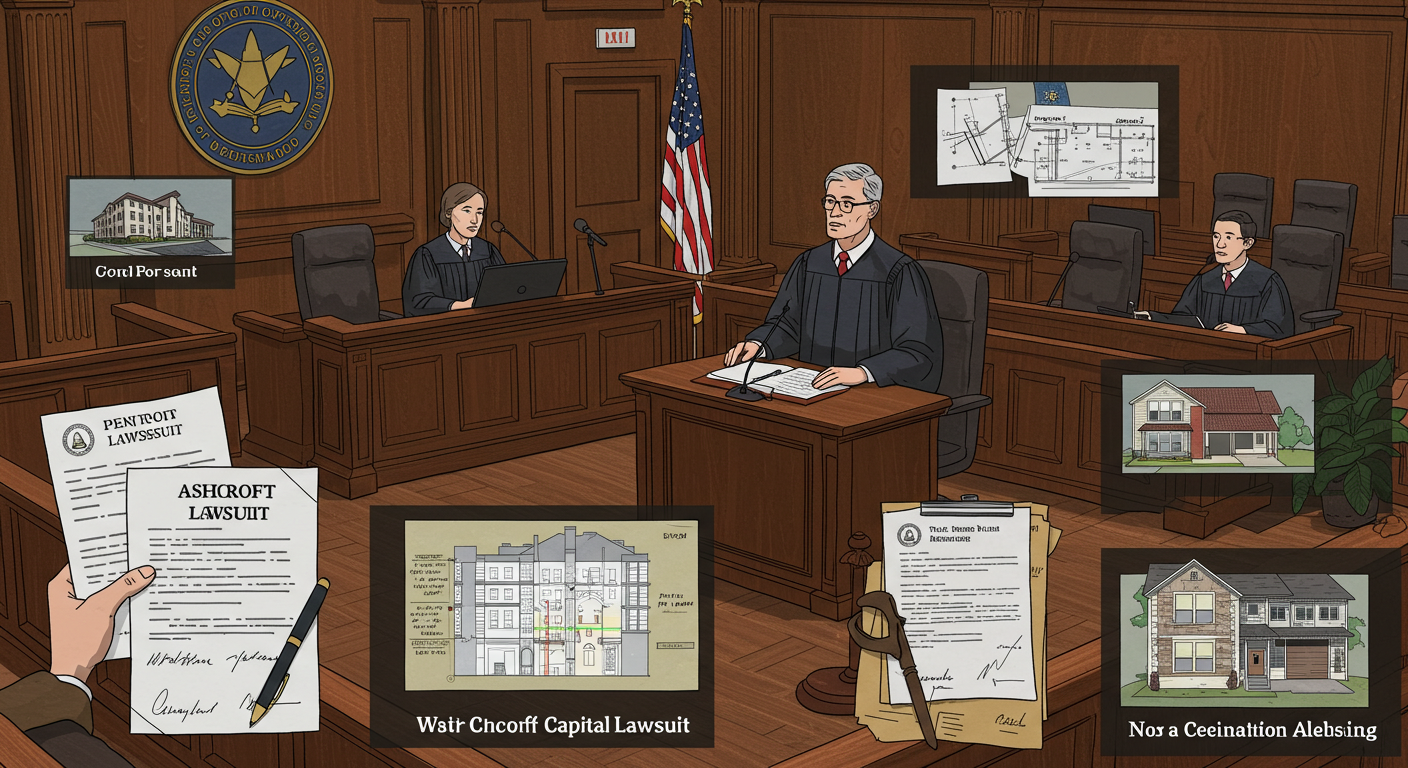Ashcroft Capital Lawsuit: Breaking Down the Real Estate Legal Dispute
In recent years, real estate syndication has gained significant traction among passive investors seeking to diversify their portfolios. One company that has become a familiar name in this space is Ashcroft Capital, a real estate investment firm known for managing multifamily properties across the United States. However, rising questions around the Ashcroft Capital lawsuit have drawn attention from investors, analysts, and industry insiders alike.
This article will examine the details surrounding the Ashcroft Capital lawsuit, highlighting its background, legal concerns, investor impact, and broader implications for the real estate syndication industry.
What Is Ashcroft Capital?
Before diving into the lawsuit, it’s important to understand the company at the center of the case. Ashcroft Capital was founded with a mission to help everyday investors participate in large real estate deals, specifically in the multifamily housing sector. The firm, led by well-known real estate investor Joe Fairless, has acquired and managed hundreds of millions of dollars in assets across various U.S. markets.
Ashcroft Capital’s business model involves acquiring apartment complexes, improving them, and sharing profits with investors. Their strategy has traditionally emphasized long-term growth, passive income, and value-add opportunities.
However, as with any investment firm handling large volumes of capital, scrutiny and legal questions are always possible.
Understanding the Ashcroft Capital Lawsuit
What Sparked the Legal Concerns?
The Ashcroft Capital lawsuit appears to stem from investor concerns related to fund management, financial disclosures, and property performance. While the full details of the litigation may not be publicly disclosed in one place, several online sources and forums have referenced potential disputes involving misaligned expectations between Ashcroft Capital and some of its passive investors.
These types of lawsuits typically focus on whether the firm:
-
Provided accurate financial forecasts
-
Appropriately managed investor funds
-
Disclosed all relevant risks transparently
-
Acted in the best interests of its investors
While the firm has not publicly admitted to any wrongdoing, the fact that legal action has surfaced suggests that trust between some investors and the company may have been tested.
Allegations Highlighted in the Ashcroft Capital Lawsuit
The Ashcroft Capital lawsuit reportedly includes several key allegations that are commonly seen in investment disputes. While not all of these are confirmed, they highlight the types of risks investors should be aware of.
1. Inaccurate Investment Projections
Some investors allege that the firm presented overly optimistic projections when marketing investment opportunities. If actual returns fell short of the promised range, legal concerns around misrepresentation could arise.
2. Lack of Transparency
Another common complaint in cases like this involves limited communication. Investors may claim that updates about property performance or fund usage were delayed or unclear, leaving them uncertain about how their money was being used.
3. Fiduciary Responsibility
Lawsuits in the real estate world often hinge on fiduciary duties. If a company is perceived to have made decisions that favored internal executives or affiliates over passive investors, legal liability becomes a real possibility.
Ashcroft Capital’s Position on the Lawsuit
As of now, Ashcroft Capital has made limited public comments regarding the lawsuit. In typical corporate fashion, firms often respond to legal claims by:
-
Denying allegations
-
Reiterating their commitment to ethical business practices
-
Providing documentation to support their case
It’s important to remember that lawsuits don’t automatically imply guilt. Many legal matters are settled privately or dismissed without a trial. The same could hold true for the Ashcroft Capital lawsuit.
Investor Impact: How the Lawsuit Affects Stakeholders
Whether you’re an existing investor with Ashcroft Capital or considering investing in similar syndication models, the lawsuit offers some important lessons.
1. Heightened Caution
When legal trouble surrounds a sponsor, both current and future investors may become hesitant. The lawsuit could impact Ashcroft Capital’s ability to raise capital for new projects in the short term.
2. Reputation and Trust
Reputation plays a major role in real estate investing. Even if the lawsuit is resolved favorably, the mere existence of legal proceedings can create reputational damage that lingers.
3. Financial Outcomes
Depending on the outcome, some investors involved in the lawsuit might recover losses or receive compensation. However, lawsuits can take months or even years to conclude.
The Bigger Picture: Legal Risk in Real Estate Syndication
The Ashcroft Capital lawsuit is not the first legal case to hit a syndication firm, nor will it be the last. Real estate investing, especially when pooled through syndications, involves shared responsibilities, legal frameworks, and mutual trust. When any of those elements break down, lawsuits are a possible consequence.
Why These Lawsuits Happen
-
Market volatility can cause unexpected losses
-
Miscommunication about deal structures may lead to investor dissatisfaction
-
Economic downturns can expose weaknesses in underwriting or property selection
Lessons for Future Investors
If there’s one positive takeaway from the Ashcroft Capital lawsuit, it’s the importance of due diligence. Here are some key steps every passive investor should take before participating in any real estate syndication:
1. Read the PPM Carefully
The Private Placement Memorandum (PPM) outlines all risks, returns, and legal disclaimers. Skimming over it can lead to misunderstandings and disappointments later.
2. Ask Questions
Investors should feel empowered to ask questions about strategy, fees, exit timelines, and past performance. If answers are vague or inconsistent, it could be a red flag.
3. Check the Track Record
Research the sponsor’s history of completed deals, investor testimonials, and public records. If prior projects have seen legal disputes, consider why.
Final Thoughts on the Ashcroft Capital Lawsuit
The Ashcroft Capital lawsuit has sparked meaningful conversations in the real estate investment community. While it’s too early to determine the final outcome, the situation emphasizes the importance of transparency, trust, and careful analysis in syndicated investments.
Whether you’re directly involved or just observing from the sidelines, staying informed is essential. Legal disputes can happen even in reputable firms, and the key to safeguarding your capital lies in understanding the risks, asking the right questions, and choosing partners wisely.







